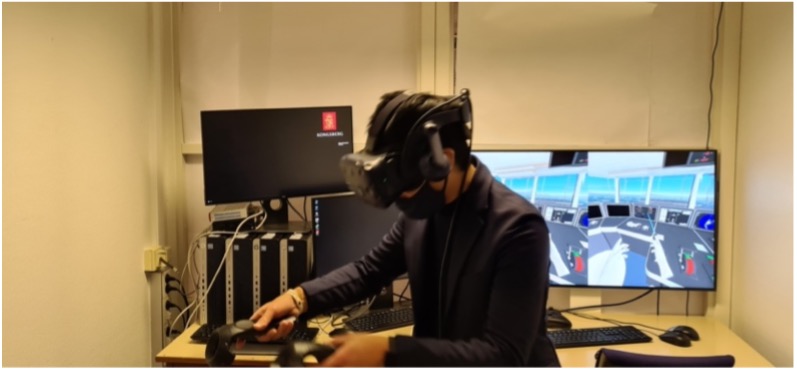The shipping industry is looking for skilled seafarers with state-of-the-art knowledge and an attitude toward learning. Simulators are traditionally used in maritime training institutes for navigation tasks and other procedural and emergency operations such as firefighting and safety training. Task-specific simulators are prevalently in different modalities, e.g., desktop-based simulators, full-mission simulators etc. The methods of training and the intended learning outcomes differ widely depending on the type of simulator and instructional quality.
In addition, the demand for off-site (i.e., remote) training has increased significantly over the last few years. Thus, novel types of simulators such as cloud-based simulators and Virtual Reality (VR) simulators have emerged in the context of maritime training. Therefore, it is an arduous task for maritime training institutes to strike the right balance between the available training solutions and the training needs.
 VR lab at USN
VR lab at USN
The Centre of Excellence in Maritime Simulator Training and Assessment (COAST) aspires to take research-based approaches to comprehend the emerging challenges in maritime training. PhD researchers in COAST are investigating how remote training of seafarers could be facilitated efficiently through cloud and VR simulators. Machine Learning and Artificial Intelligence (AI) solutions are envisaged to be crucial in delivering viable off-site training, potentially alleviating the necessity of on-site instructors for training. Hasan, a COAST PhD student is particularly looking into ways how we can reduce the burden on maritime instructors and provide standalone VR training simulators with integrated AI assessment tools suitable for remote training. William, another COAST PhD student is investigating novel methods of training using Could simulators.
With our dedicated PhD researchers in COAST, we are trying to address several research problems. The research work on use of Virtual Reality to complement existing simulator training and utilizing cloud simulation to train anywhere and anytime can help us to move towards sustainability by eliminating the emission-intensive travel and mobility requirements for on-site training, reducing cost of training as well as the supervision required for the trainees in physical locations.
– Salman Nazir, Scientific leader, COAST
